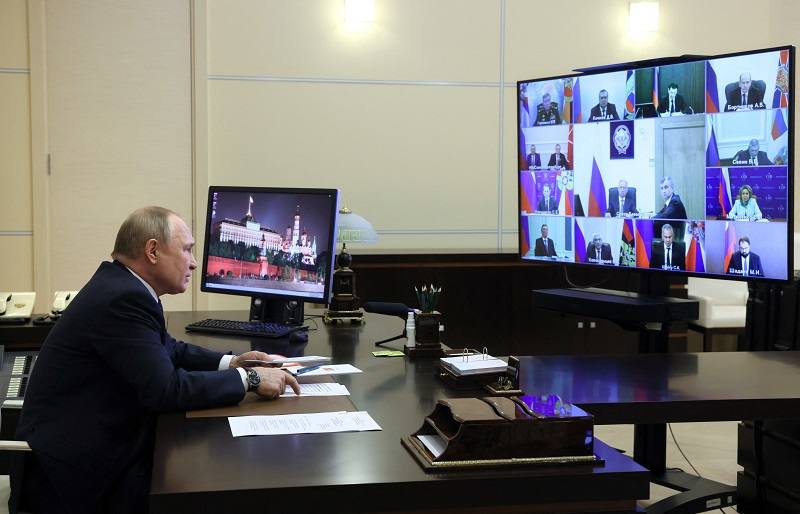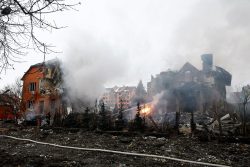
File Photo: Russian President Vladimir Putin chairs a meeting with members of the Security Council via a video link at the Novo-Ogaryovo state residence outside Moscow, Russia May 20, 2022.
10:59 JST, May 25, 2022
LONDON (Reuters) – Russia’s parliament on Tuesday passed a bill giving prosecutors powers to shut foreign media bureaus in Moscow if a Western country has been “unfriendly” to Russian media, following the closure of some Russian state news outlets in the West.
The bill, passed in the first reading by the lower house of parliament, or Duma, also prohibits the distribution of articles or other materials from media that have been closed by the prosecutor’s office. It needs to undergo two more readings, be reviewed by the upper house of parliament, and signed by President Vladimir Putin to become law.
The journalists of a media organisation deemed to be an offender under the bill would have their foreign ministry accreditation withdrawn – meaning they could not work in Russia.
The new bill adds to the challenges facing foreign media after Russia in March adopted a law which penalized what it termed spreading “fake” news about its army.
“In the current geopolitical situation, the mass media has become an instrument of influence on the informational state of society,” the lawmakers said in an official explanatory note on the bill.
The note, which Reuters has seen, also stated: “In accordance with the bill, a journalist and a foreign correspondent may lose their accreditation if the fact of unfriendly action is established through the imposition of restrictions on the distribution of Russian mass media operating in a foreign country.”
The bill was introduced by influential lawmakers, including Andrei Lugovoy, who was charged in absentia by British prosecutors for the 2006 poisoning murder of Alexander Litvinenko. Lugovoy, a former KGB bodyguard, has repeatedly denied the charges.
Russia’s foreign minister, Sergei Lavrov, has repeatedly scolded the West for preventing pro-Kremlin media such as the Sputnik news agency and RT television channel from operating by withdrawing their broadcasting licenses and sanctioning the outlets, steps he says show a disregard for media freedom.
In March, President Vladimir Putin signed a law imposing a jail term of up to 15 years for spreading intentionally “fake” news about the military, prompting some Western media to pull their journalists out of Russia. Other Western organisations, including Reuters, have stayed in the country and continue to report.
Russian officials do not use the word “invasion” and say Western media have provided an excessively partial narrative of what they call Russia’s “special operation” in Ukraine that ignores Russia’s concerns about the enlargement of NATO and alleged persecution of Russian-speakers.
Top Articles in News Services
-

Survey Shows False Election Info Perceived as True
-

Prudential Life Expected to Face Inspection over Fraud
-

Hong Kong Ex-Publisher Jimmy Lai’s Sentence Raises International Outcry as China Defends It
-

Japan’s Nikkei Stock Average Touches 58,000 as Yen, Jgbs Rally on Election Fallout (UPDATE 1)
-

Japan’s Nikkei Stock Average Falls as US-Iran Tensions Unsettle Investors (UPDATE 1)
JN ACCESS RANKING
-

Japan PM Takaichi’s Cabinet Resigns en Masse
-

Japan Institute to Use Domestic Commercial Optical Lattice Clock to Set Japan Standard Time
-

Israeli Ambassador to Japan Speaks about Japan’s Role in the Reconstruction of Gaza
-

Man Infected with Measles Reportedly Dined at Restaurant in Tokyo Station
-

Videos Plagiarized, Reposted with False Subtitles Claiming ‘Ryukyu Belongs to China’; Anti-China False Information Also Posted in Japan

























